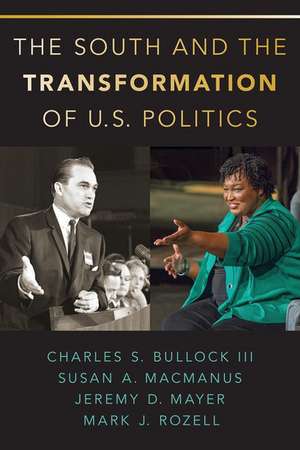The South and the Transformation of U.S. Politics
Autor Charles S. Bullock, Susan A. MacManus, Jeremy D. Mayer, Mark J. Rozellen Limba Engleză Paperback – 16 oct 2019
| Toate formatele și edițiile | Preț | Express |
|---|---|---|
| Paperback (1) | 177.32 lei 31-37 zile | |
| Oxford University Press – 16 oct 2019 | 177.32 lei 31-37 zile | |
| Hardback (1) | 583.77 lei 31-37 zile | |
| Oxford University Press – 16 oct 2019 | 583.77 lei 31-37 zile |
Preț: 177.32 lei
Preț vechi: 218.97 lei
-19% Nou
Puncte Express: 266
Preț estimativ în valută:
33.94€ • 36.88$ • 28.53£
33.94€ • 36.88$ • 28.53£
Carte tipărită la comandă
Livrare economică 09-15 aprilie
Preluare comenzi: 021 569.72.76
Specificații
ISBN-13: 9780190065928
ISBN-10: 0190065923
Pagini: 208
Dimensiuni: 208 x 137 x 15 mm
Greutate: 0.27 kg
Editura: Oxford University Press
Colecția OUP USA
Locul publicării:New York, United States
ISBN-10: 0190065923
Pagini: 208
Dimensiuni: 208 x 137 x 15 mm
Greutate: 0.27 kg
Editura: Oxford University Press
Colecția OUP USA
Locul publicării:New York, United States
Recenzii
The book is rich with data and contextual analysis, and these esteemed authors provide compelling evidence to support their thesis that the Southdidinfluence politics at the national level as they unpack the region's present racial dynamics, demographics, and religious identity.
This isn't your grandparents' South anymore. The authors expertly highlight the profound demographic, economic, and political transformation taking place in the South in the second decade of the 21st century. The South and the Transformation of U.S. Politics will be required reading for all trying to understand southern politics in the early 21st century.
This book is a valuable resource for anyone seeking to gain insight into the contemporary world of Southern politics. Bullock et al. provide a much-needed scholarly update, focusing on the major themes of demographics, partisanship, race, and religion that undergird politics in the region.
In 1949, V.O. Key described a South that was ruled by white conservatives, whichneeded democracy, and which held the prospect for pluralist politics. Three generations later, the South is dramatically transformed as blacks and Hispanics enter politics; the cities and suburbs hold ample political power; the economy of the region diversifies and booms; and, still, yet, conservatives dominate the politics and we continue to ponder whether democracy in the South is to be had, or earned. This book needs to sit on the desk of every student of American politics, because the past still ain't even past in the South.
This isn't your grandparents' South anymore. The authors expertly highlight the profound demographic, economic, and political transformation taking place in the South in the second decade of the 21st century. The South and the Transformation of U.S. Politics will be required reading for all trying to understand southern politics in the early 21st century.
This book is a valuable resource for anyone seeking to gain insight into the contemporary world of Southern politics. Bullock et al. provide a much-needed scholarly update, focusing on the major themes of demographics, partisanship, race, and religion that undergird politics in the region.
In 1949, V.O. Key described a South that was ruled by white conservatives, whichneeded democracy, and which held the prospect for pluralist politics. Three generations later, the South is dramatically transformed as blacks and Hispanics enter politics; the cities and suburbs hold ample political power; the economy of the region diversifies and booms; and, still, yet, conservatives dominate the politics and we continue to ponder whether democracy in the South is to be had, or earned. This book needs to sit on the desk of every student of American politics, because the past still ain't even past in the South.
Notă biografică
Charles S. Bullock, III, is the Distinguished University Professor of Public and International Affairs, holds the Richard B. Russell Chair in Political Science, and is Josiah Meigs Distinguished Teaching Professor at the University of Georgia. In 2005 and 2009, he was a senior fellow at Oxford University's Rothermere American Institute. Susan A. MacManus is Distinguished University Professor Emerita at the University of South Florida. Beginning with the 2016 presidential election cycle, she has been the political analyst for WFTS-TV (ABC Action News, Tampa). She is the author of numerous publications on politics and history, and also serves on the UF Bob Graham Center For Public Service Council of Advisors and on the Board of Directors of the Florida TaxWatch Center for Florida Citizenship.Jeremy D. Mayer is Associate Professor in the Schar School of Policy and Government at George Mason University. He has written books and articles on diverse topics such as race andpresidential campaigns, public opinion toward torture, presidential image management, Christian right politics, federalism and gay rights, and comparative political socialization.Mark J. Rozell is the founding dean of the Schar School of Policy and Government, and the Ruth D. and John T. Hazel Chair in Public Policy at George Mason University. He is the author of numerous published studies on various topics in U.S. government and politics, including the presidency, religion and politics, southern politics, and interest group politics.
